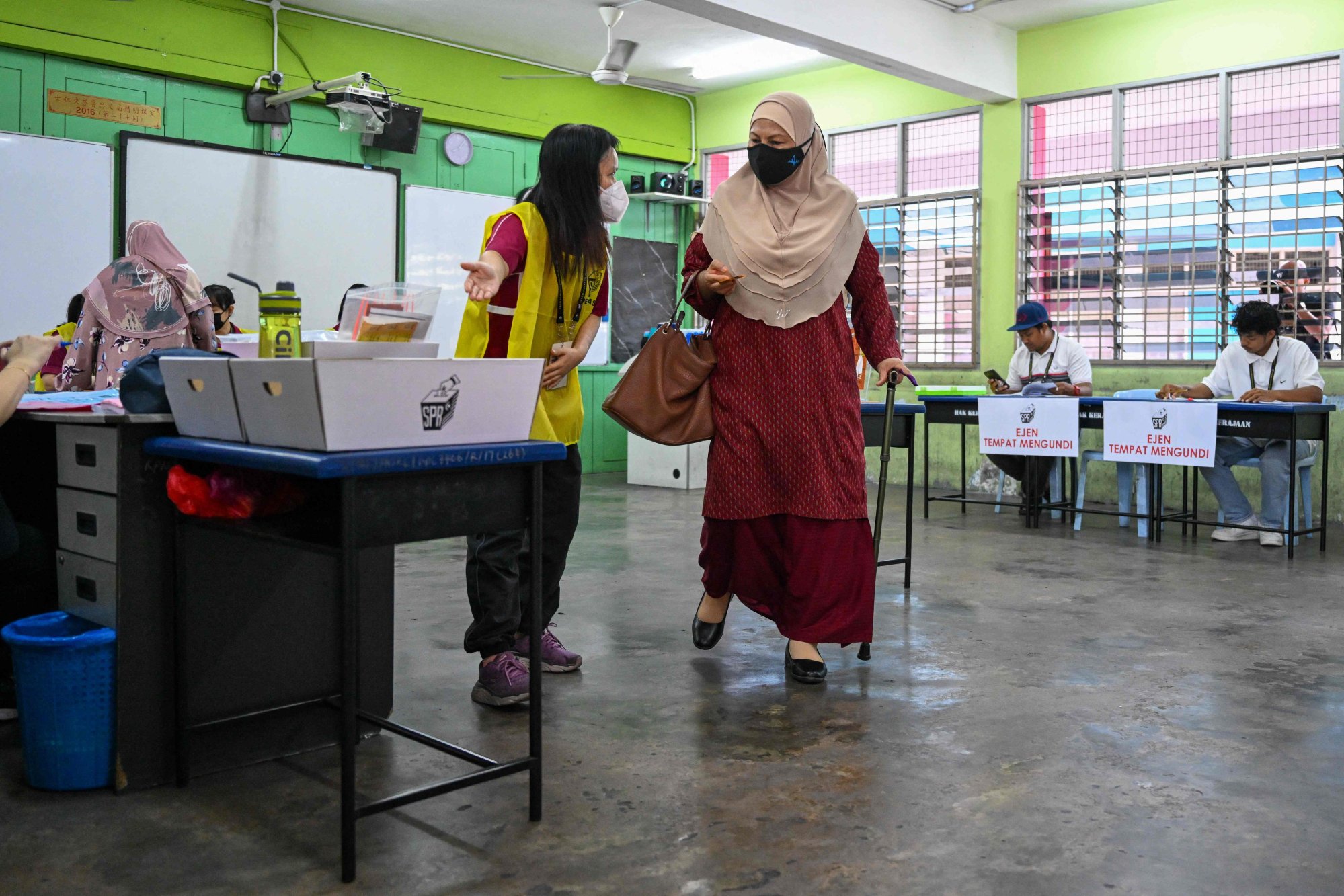
Relief for Malaysian leader Anwar as opposition fails to alter status quo in state elections
- Early unofficial counts indicated voting trends going along initial forecasts, with the incumbent governments expected to retain power
- The Election Commission said turnout was between 60 per cent and 70 per cent in each state, two hours before voting ended
Ballot counting was under way after voting ended on Saturday in crucial state elections in Malaysia, where Prime Minister Anwar Ibrahim’s multi-coalition government is seeking to reinforce its position against a strong Islamic opposition.
About 9.7 million people were eligible to vote to choose the next governments for the six states – the Perikatan Nasional (PN) opposition-held Kedah, Kelantan and Terengganu in the North, and Negeri Sembilan, Penang and Selangor, where the government parties of the Pakatan Harapan (PH) dominated coalition hold sway.
As of 4pm, or two hours before voting ended, the Election Commission said turnout was between 60 per cent and 70 per cent in each of the states. The final turnout has not been tallied but it appeared lower than the overall target of 85 per cent by the commission.
A tepid turnout in crucial polls across six Malaysian states is likely to be felt most sharply by Anwar and his unity government, experts said late on Saturday, after a campaign where the opposition cast him as neglectful of the Malay-Muslim majority and marshalled TikTok to drive an Islamist agenda.
Counting was set to stretch into Saturday night and the outcome of the state contests will have little direct bearing on Anwar’s hold on federal power.
Yet the polls are a litmus test of support for him and his rag-tag administration of allies and former foes in a politically combustible nation where governments struggle to last their full term.
Kelantan was the first to be called by the Election Commission, with PAS retaining the state – which borders Thailand’s Muslim-majority south – after securing a simple majority of 23 out of 45 seats ahead of the final tally.
Early unofficial counts by political parties indicated voting trends going along initial forecasts, with the incumbent governments expected to retain power including in Kedah, Negeri Sembilan and Penang.
Since becoming premier in November, Anwar has shed fans among Malays who have shifted towards the Malay nationalist PN and the galvanised Islamist party PAS.
But Anwar has also dismayed some of his own party faithful who remain uncomfortable with his partners in government.
Throughout Saturday’s polling, politicians from all sides called on the electorate to cast their ballots, as the early signs pointed to an uninspired turnout rippled out.
“Through your vote we choose leaders who will represent us”, Abdul Hadi Awang, president of PAS, the Islamist opposition party, told reporters. “This is a big responsibility, so do not take this lightly, especially for the Muslims”.
But initial figures just hours before the polls closed shared by the Election Commission pointed to between 56-68 per cent turnout, with only Terengganu appearing to have hit the 70 per cent mark, far short of official pre-poll estimates of an 85 per cent turnout in the six states.

The opposition PN targeted the Malay base, showering TikTok videos in its outreach to voters in Malay heartland areas and leaving PAS to whip up culture wars and sell a story of Malay neglect by Anwar’s administration.
Those areas have been especially hard hit by soaring living costs and persistent inflation.
In Rawang, on the fringe between Selangor’s highly urbanised centre and its more rural hinterlands, roadside food seller Zulkifli Che Ani indicated his vote was swinging behind PN.
“Let’s go for change this round,” he said.
Meanwhile, in Kelantan, octogenarian Saleha Mustopa was appalled by the choice of candidates, saying she was voting instead for Islamist party PAS.
“I don’t like Anwar Ibrahim,” she said when asked why.

During the campaign, Anwar criss-crossed the country to reach as many Malay-majority areas as possible.
But experts say the turnout may reflect his failure to cut through.
“Generally, lower turnout favours PN. This will impact PH,” political analyst Bridget Welsh said.
The low turnout could be down to the corrosive impact of Malaysia’s unrelenting politicking since the 2020 political coup, which eventually churned out the unlikely Anwar as prime minister late last year, experts speculated.
Voters may have seen Saturday’s polls as “an exercise in futility”, said Oh Ei Sun, a senior fellow with the Singapore Institute of International Affairs.
This was especially the case for supporters of Anwar’s Pakatan Harapan (PH) coalition, which formed an alliance with erstwhile rivals Barisan Nasional (BN) and its linchpin party Umno, who have long been accused of rampant corruption and abuse of power over their six decade rule, he added.
The turnout may be “a silent protest among PH supporters, as they could not bring themselves to vote for PN but feel PH has let them down,” Ei Sun told This Week in Asia.
PN has hooked hopes on its social media campaign, which outstripped the government’s internet appeal.
A recent TikTok live session featuring the controversial chief minister of Kedah, Muhammad Sanusi Md Nor drew more than 62,000 views and 16 million likes.
Muhammad Sanusi on Thursday said voters are well acquainted with the “true face” of Anwar, who he said had made countless lofty promises for over two decades to better the lives of all Malaysians.
“For twenty-five years he was begging to be made PM. After he was given the mandate, eight months later nothing has happened,” Sanusi said.
Additional reporting by Associated Press


